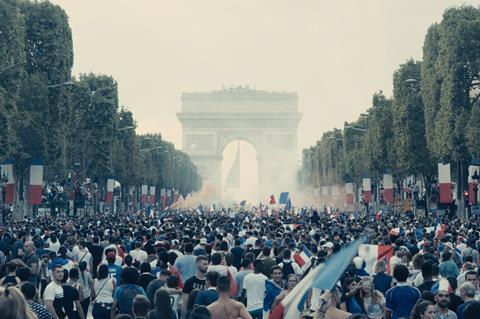Competition hots up with an explosive debut feature set in one of Paris’s riotous banlieues

Dir. Ladj Ly. France. 2019. 102 mins.
French society is a tinderbox and it’s all going to blow– that’s the not entirely unpredictable message of Les Misérables, the debut feature by Ladj Ly. A member of the Kourtrajmé film-making collective, Ly made a splash with his documentaries and César-nominated 2017 short also called Les Misérables and starring this feature’s three leads. The extended version, a story of cops and the population of a tough estate near Paris, is in many ways a textbook example of the banlieue film - the realist genre by which French cinema has measured social tensions since the late 80s and early 90s, most famously in Mathieu Kassovitz’s La Haine. But for all its familiarity, Ly’s film is executed with enormous confidence and energy, building up to an apocalyptic ending that delivers on a gradual build-up of nervous tension. Punchy use of cop-thriller structure should give the film purchase with genre audiences, while newsworthy urgency should make it a talking point in France and beyond, even if the film doesn’t bring anything radically new to the topic.
A dazzlingly executed showdown carries potent strong overtones of the French revolutionary tradition
The setting is the eastern Parisian suburb of Montfermeil, where Ly was born and which he has studied in his documentaries. It is also a key setting in Victor Hugo’s Les Misérables – and, despite references to it, the film doesn’t attempt to provide a modern take on the novel’s narrative, simply arguing that living conditions in Montfermeil have barely improved since Hugo’s time. The film begins with docu-style sequences showing the African and Maghrebin youth of Montfermeil heading to Paris to support France in the World Cup, and revelling in their shared national identity; what follows shows that France hasn’t altogether welcomed these populations with open arms.
The main action is set over two days, with cop Stéphane (a somewhat sullen Damien Bonnard, from Alain Guiraudie’s Staying Vertical) joining Montfermeil’s Anti-Crime Squad, where he is teamed with Gwada (Djebril Zonga), of African descent, and Chris (the film’s co-writer Alexis Manenti), aka ‘Pink Pig’, an aggressively rule-flouting white alpha male. After a station briefing from the local squad chief (a crisply eccentric Jeanne Balibar), Stéphane is taken out for an initiation tour, giving us a whirlwind overview of the notoriously deprived Le Bosquet estate, where kids are policed by the local Muslim Brotherhood and where African boss ‘the Mayor’ (an imposing Steve Tchentchieu) sets the secular rules.
Meanwhile, children and young adolescents do things their own way – notably, tech-savvy Buzz (Al-Hassan Ly), who uses drones for recreational voyeurism, and Issa (Issa Perica), an exuberant tearaway whose theft of a lion cub from a visiting circus is the spark that sets everything alight. As a result, one of Buzz’s drone videos captures the Squad’s heavy-handed methods. A long build-up features plenty of scowlingly macho confrontations, notably when locals go head to head with a belligerent circus family – and while these scenes somewhat outstay their welcome, Ly shows a rare talent for maximising the energy in such face-offs, mixing known actors and local non-professionals.
There’s a slightly awkward intermezzo at the end of day one, as Stéphane –a careworn, conscience-laden good guy - muses glumly on the ethics of community policing, with explicit reference to the banlieue riots of 2005. But things pick up briskly in a dazzlingly executed showdown, as the youth of Monfermeil rise up in a sequence which – bearing the Hugo references in mind – carries potent strong overtones of the French revolutionary tradition.
Ly’s humanistic heart shows through the toughness, although his ensemble portrayal of a community is somewhat undermined by the emphasis on Stéphane’s experience. The drama can also be also exhaustingly male, tending to sideline females, who appear largely as teenagers or as long-suffering, sometimes indomitable matriarchs, and have little real agency in the drama. A further minus is the sometimes earnest tone – for all the wisecracking, there’s a marked dearth of humour and lightness. Among the leads, Manenti owns the film as a mesmerisingly antipathetic bad cop and mirthless joker, at once bullish and compellingly whiny. The film benefits from vivid action captured by Julien Poupard’s mobile, pacey camerawork, notably in a full-on chase scene, and from charismatic performances from unknowns, notably young Perica, whose Issa finally achieves a compelling iconic status.
Production companies: SRAB Films, Rectangle Productions, Lyly Films
International sales: Wild Bunch, ediederix@wildbunch.eu
Producers: Toufik Ayadi, Christophe Barral
Screenplay: Ladj Ly, Giordano Gederlini, Alexis Manenti
Cinematography: Julien Poupard
Editing: Flora Volpelière
Production design: Karim Lagati
Music: Pink Noise
Main cast: Damien Bonnard, Alexis Manenti, Djebril Zonga, Issa Perica , Jeanne Balibar






![The Brightest SunScreen[Courtesy HKIFF]](https://d1nslcd7m2225b.cloudfront.net/Pictures/274x183/3/5/0/1448350_thebrightestsunscreencourtesyhkiff_312678.jpg)















![The Brightest SunScreen[Courtesy HKIFF]](https://d1nslcd7m2225b.cloudfront.net/Pictures/100x67/3/5/0/1448350_thebrightestsunscreencourtesyhkiff_312678.jpg)

